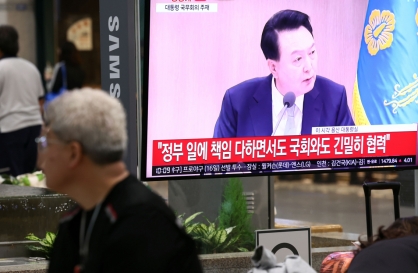Four-river restoration project opponents changing their tune after seeing improvements: Shim
For the last three years, the Lee Myung-bak government has been struggling to convince its own people of the worthiness of its multi-billion-dollar project to modify the country’s four largest river basins.
But residents, who were fiercely resistant to the project, have become increasingly positive as they see the watercourses in better shape and once-fragile streams survive floods, said Shim Myung-pil, head of the Office of National River Restoration under the Ministry of Land, Transport and Maritime Affairs.
Further, the government is now turning its eyes abroad and hoping to export its technological prowess.
“We’ve around 80 percent of the whole process completed and the rest will be largely about wrapping things up and ensuring maintenance. But the gist of the remaining 20 percent is transferring our know-how to other developing countries,” Shim told The Korea Herald Friday on the sidelines of a global forum hosted by the government to review the project.
Among the potential importers are Morocco, Paraguay, Malaysia and Vietnam, according to Shim, all of which are considering adopting Korea’s techniques for their own river restoration programs.
Morocco and Paraguay in particular showed strong interest, he noted. King Mohammed VI of Morocco has sent several envoys here to discuss partnership. Liz Rosanna Cramer Campos, the Paraguayan Tourism Minister, is also visiting Seoul to look into the subject with Shim.
For the last three years, the Lee Myung-bak government has been struggling to convince its own people of the worthiness of its multi-billion-dollar project to modify the country’s four largest river basins.
But residents, who were fiercely resistant to the project, have become increasingly positive as they see the watercourses in better shape and once-fragile streams survive floods, said Shim Myung-pil, head of the Office of National River Restoration under the Ministry of Land, Transport and Maritime Affairs.
Further, the government is now turning its eyes abroad and hoping to export its technological prowess.
“We’ve around 80 percent of the whole process completed and the rest will be largely about wrapping things up and ensuring maintenance. But the gist of the remaining 20 percent is transferring our know-how to other developing countries,” Shim told The Korea Herald Friday on the sidelines of a global forum hosted by the government to review the project.
Among the potential importers are Morocco, Paraguay, Malaysia and Vietnam, according to Shim, all of which are considering adopting Korea’s techniques for their own river restoration programs.
Morocco and Paraguay in particular showed strong interest, he noted. King Mohammed VI of Morocco has sent several envoys here to discuss partnership. Liz Rosanna Cramer Campos, the Paraguayan Tourism Minister, is also visiting Seoul to look into the subject with Shim.

“Water security is a global issue since climate change has likely triggered extreme weather events accompanied by droughts, floods and water shortages even in advanced countries,” Shim said.
The Lee Myung-bak administration set out on the five-year project in mid-2009 in a bid to step up water quality, flood management and ecosystem balance in the basins of the nation’s four major rivers ― Han, Geum, Yeongsan and Nakdong.
The 22 trillion won ($18.6 billion) package entails building 15 reservoirs, refurbishing more than 900 kilometers of tributary streams and adjacent wetlands and setting up leisure and anti-disaster prevention facilities, as well as clean energy generators.
But the plan, which plays a central part in Lee’s “green growth” initiative, has repeatedly faced setbacks since its introduction.
Opposition lawmakers first branded the project a “costly political venture,” demanding that the construction of large-scale river barrages, dams and bike roads be called off.
Some local governments then boycotted the work. Civic groups and environmentalists staged protests in areas along the rivers, raising concerns over the feasibility of the project and wildlife conservation.
“I think the program had been taken too politically,” Shim said. “But this is not a political issue but a technical one, which requires technical discussions, not such ideological, political disputes.”
In efforts to address persistent environmental concerns, the Land Ministry is keeping close track of the habitats of endangered species and striving to reinforce protection measures.
Yet the project remains controversial. Shim said the government is now ready to show “how it has realized what it had promised.”
Starting last month, the ministry is introducing the 16 new reservoirs to the public as its work on the main streams of the four rivers is nearing an end.
More than 3,000 residents attended opening ceremonies for the Sejong and Baekje Reservoirs in the Geum River basin, South Chungcheong Province, the ministry said.
“It was far more than our estimates of around 2,500,” Shim said. “Many residents who were once skeptical gave us positive reviews after seeing how the Geum River changed. I want to ask all other Koreans to see it for themselves and experience it.”
By Shin Hyon-hee (heeshin@heraldcorp.com)







![[From the Scene] Monks, Buddhists hail return of remains of Buddhas](http://res.heraldm.com/phpwas/restmb_idxmake.php?idx=644&simg=/content/image/2024/04/19/20240419050617_0.jpg&u=20240419175937)







![[From the Scene] Monks, Buddhists hail return of remains of Buddhas](http://res.heraldm.com/phpwas/restmb_idxmake.php?idx=652&simg=/content/image/2024/04/19/20240419050617_0.jpg&u=20240419175937)

![[KH Explains] Hyundai's full hybrid edge to pay off amid slow transition to pure EVs](http://res.heraldm.com/phpwas/restmb_idxmake.php?idx=652&simg=/content/image/2024/04/18/20240418050645_0.jpg&u=20240419100350)

![[Today’s K-pop] Illit drops debut single remix](http://res.heraldm.com/phpwas/restmb_idxmake.php?idx=642&simg=/content/image/2024/04/19/20240419050612_0.jpg&u=)